Human Resource - Industrialization
VerifiedAdded on 2022/08/27
|13
|3788
|18
AI Summary
Contribute Materials
Your contribution can guide someone’s learning journey. Share your
documents today.
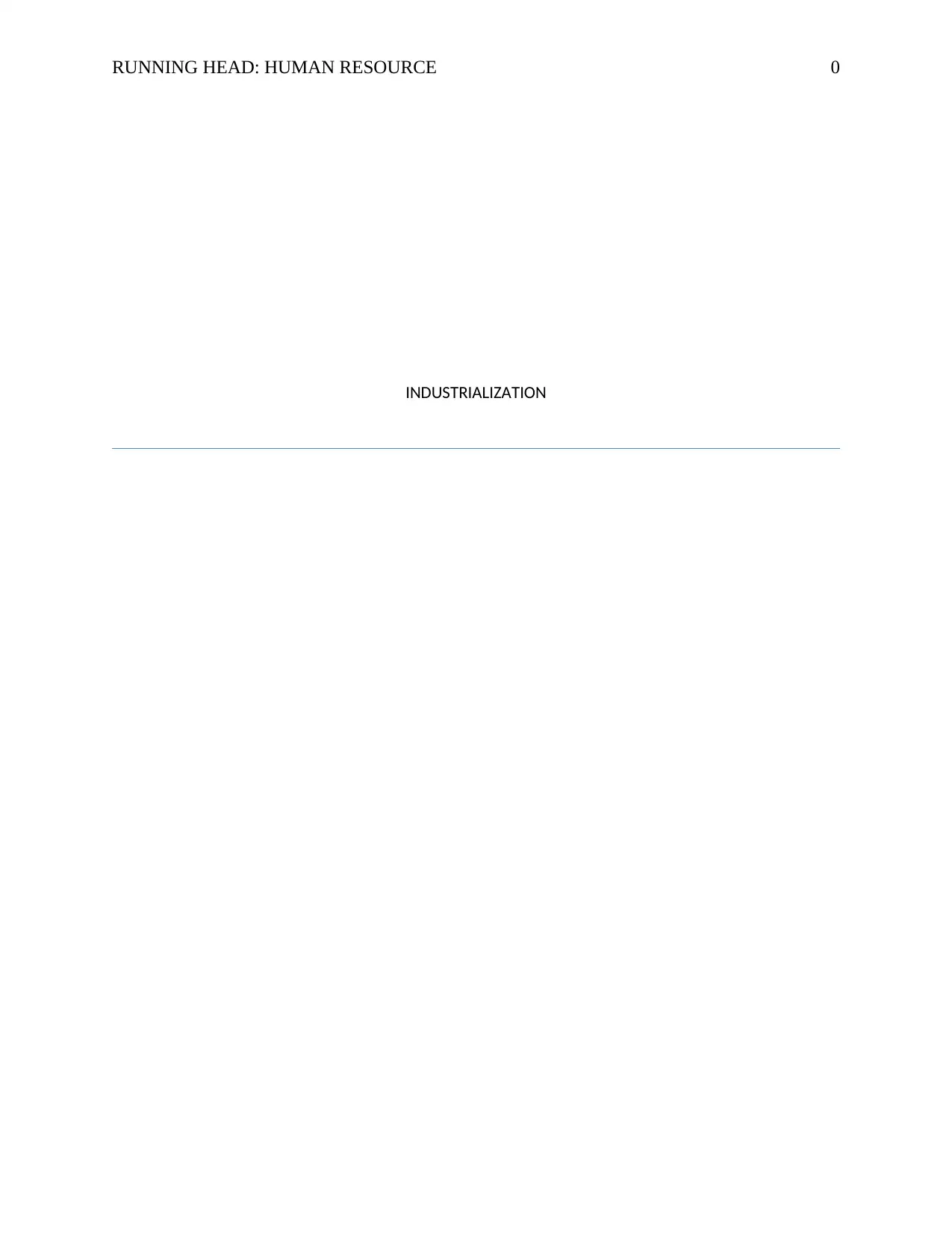
RUNNING HEAD: HUMAN RESOURCE 0
INDUSTRIALIZATION
INDUSTRIALIZATION
Secure Best Marks with AI Grader
Need help grading? Try our AI Grader for instant feedback on your assignments.
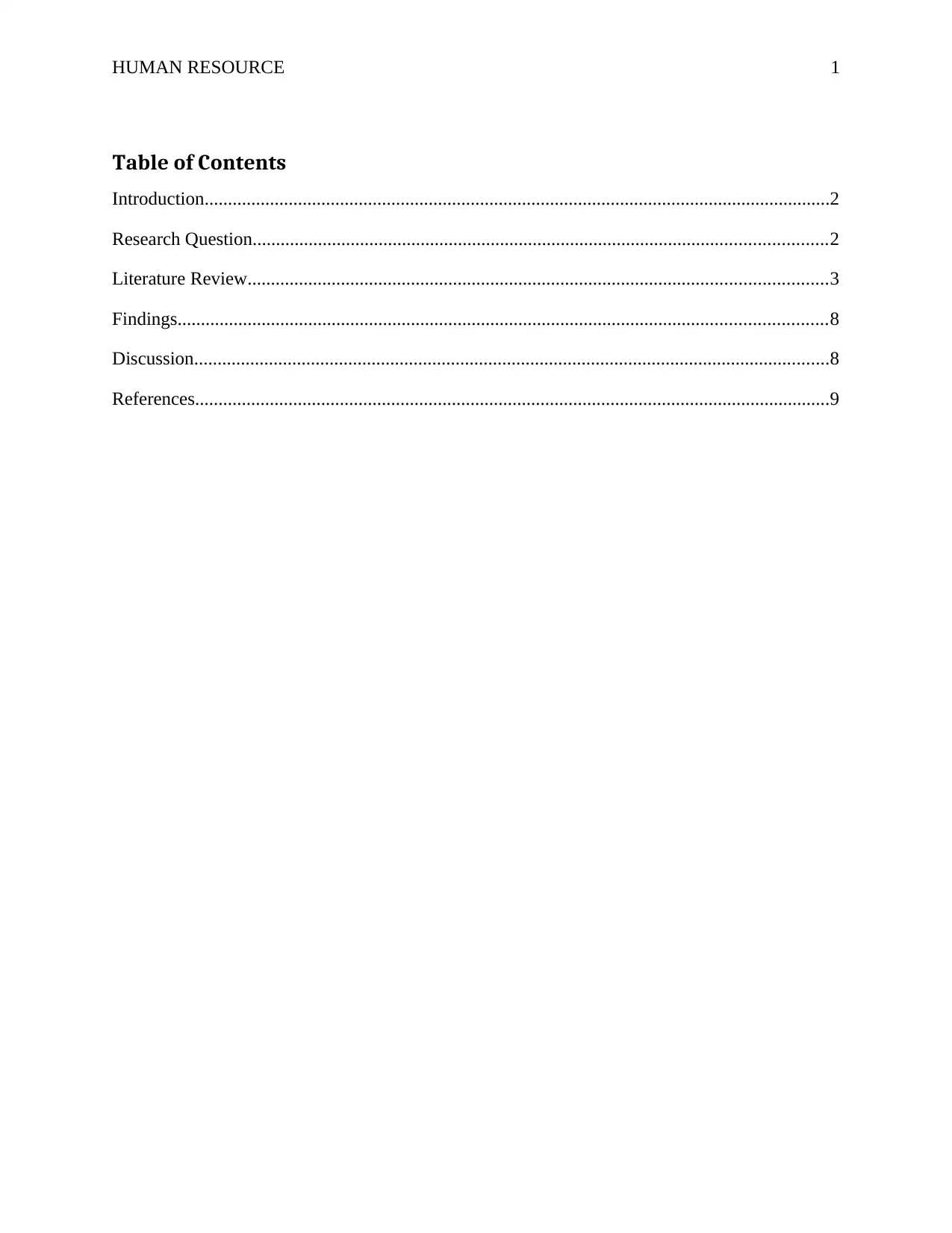
HUMAN RESOURCE 1
Table of Contents
Introduction......................................................................................................................................2
Research Question...........................................................................................................................2
Literature Review............................................................................................................................3
Findings...........................................................................................................................................8
Discussion........................................................................................................................................8
References........................................................................................................................................9
Table of Contents
Introduction......................................................................................................................................2
Research Question...........................................................................................................................2
Literature Review............................................................................................................................3
Findings...........................................................................................................................................8
Discussion........................................................................................................................................8
References........................................................................................................................................9
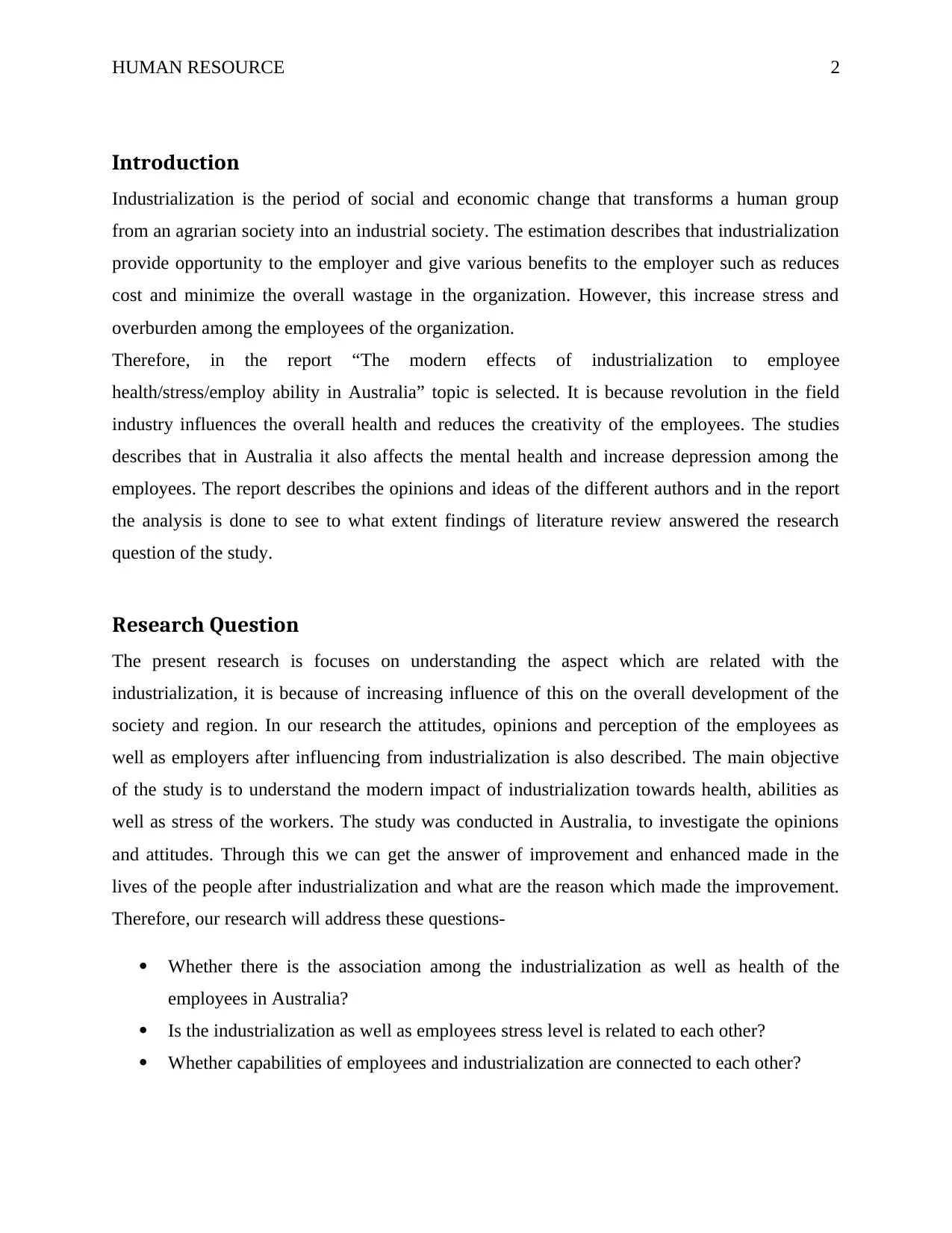
HUMAN RESOURCE 2
Introduction
Industrialization is the period of social and economic change that transforms a human group
from an agrarian society into an industrial society. The estimation describes that industrialization
provide opportunity to the employer and give various benefits to the employer such as reduces
cost and minimize the overall wastage in the organization. However, this increase stress and
overburden among the employees of the organization.
Therefore, in the report “The modern effects of industrialization to employee
health/stress/employ ability in Australia” topic is selected. It is because revolution in the field
industry influences the overall health and reduces the creativity of the employees. The studies
describes that in Australia it also affects the mental health and increase depression among the
employees. The report describes the opinions and ideas of the different authors and in the report
the analysis is done to see to what extent findings of literature review answered the research
question of the study.
Research Question
The present research is focuses on understanding the aspect which are related with the
industrialization, it is because of increasing influence of this on the overall development of the
society and region. In our research the attitudes, opinions and perception of the employees as
well as employers after influencing from industrialization is also described. The main objective
of the study is to understand the modern impact of industrialization towards health, abilities as
well as stress of the workers. The study was conducted in Australia, to investigate the opinions
and attitudes. Through this we can get the answer of improvement and enhanced made in the
lives of the people after industrialization and what are the reason which made the improvement.
Therefore, our research will address these questions-
Whether there is the association among the industrialization as well as health of the
employees in Australia?
Is the industrialization as well as employees stress level is related to each other?
Whether capabilities of employees and industrialization are connected to each other?
Introduction
Industrialization is the period of social and economic change that transforms a human group
from an agrarian society into an industrial society. The estimation describes that industrialization
provide opportunity to the employer and give various benefits to the employer such as reduces
cost and minimize the overall wastage in the organization. However, this increase stress and
overburden among the employees of the organization.
Therefore, in the report “The modern effects of industrialization to employee
health/stress/employ ability in Australia” topic is selected. It is because revolution in the field
industry influences the overall health and reduces the creativity of the employees. The studies
describes that in Australia it also affects the mental health and increase depression among the
employees. The report describes the opinions and ideas of the different authors and in the report
the analysis is done to see to what extent findings of literature review answered the research
question of the study.
Research Question
The present research is focuses on understanding the aspect which are related with the
industrialization, it is because of increasing influence of this on the overall development of the
society and region. In our research the attitudes, opinions and perception of the employees as
well as employers after influencing from industrialization is also described. The main objective
of the study is to understand the modern impact of industrialization towards health, abilities as
well as stress of the workers. The study was conducted in Australia, to investigate the opinions
and attitudes. Through this we can get the answer of improvement and enhanced made in the
lives of the people after industrialization and what are the reason which made the improvement.
Therefore, our research will address these questions-
Whether there is the association among the industrialization as well as health of the
employees in Australia?
Is the industrialization as well as employees stress level is related to each other?
Whether capabilities of employees and industrialization are connected to each other?
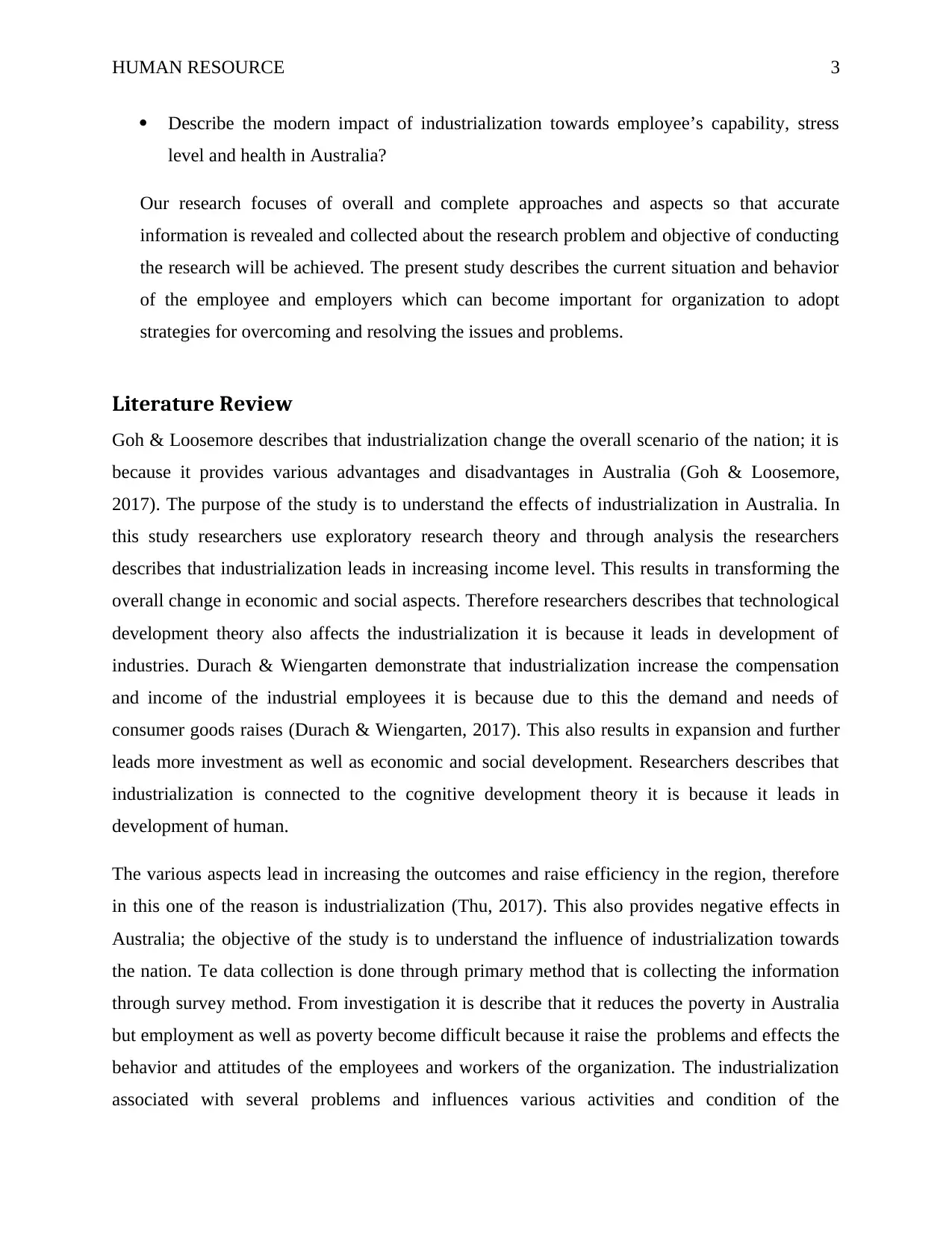
HUMAN RESOURCE 3
Describe the modern impact of industrialization towards employee’s capability, stress
level and health in Australia?
Our research focuses of overall and complete approaches and aspects so that accurate
information is revealed and collected about the research problem and objective of conducting
the research will be achieved. The present study describes the current situation and behavior
of the employee and employers which can become important for organization to adopt
strategies for overcoming and resolving the issues and problems.
Literature Review
Goh & Loosemore describes that industrialization change the overall scenario of the nation; it is
because it provides various advantages and disadvantages in Australia (Goh & Loosemore,
2017). The purpose of the study is to understand the effects of industrialization in Australia. In
this study researchers use exploratory research theory and through analysis the researchers
describes that industrialization leads in increasing income level. This results in transforming the
overall change in economic and social aspects. Therefore researchers describes that technological
development theory also affects the industrialization it is because it leads in development of
industries. Durach & Wiengarten demonstrate that industrialization increase the compensation
and income of the industrial employees it is because due to this the demand and needs of
consumer goods raises (Durach & Wiengarten, 2017). This also results in expansion and further
leads more investment as well as economic and social development. Researchers describes that
industrialization is connected to the cognitive development theory it is because it leads in
development of human.
The various aspects lead in increasing the outcomes and raise efficiency in the region, therefore
in this one of the reason is industrialization (Thu, 2017). This also provides negative effects in
Australia; the objective of the study is to understand the influence of industrialization towards
the nation. Te data collection is done through primary method that is collecting the information
through survey method. From investigation it is describe that it reduces the poverty in Australia
but employment as well as poverty become difficult because it raise the problems and effects the
behavior and attitudes of the employees and workers of the organization. The industrialization
associated with several problems and influences various activities and condition of the
Describe the modern impact of industrialization towards employee’s capability, stress
level and health in Australia?
Our research focuses of overall and complete approaches and aspects so that accurate
information is revealed and collected about the research problem and objective of conducting
the research will be achieved. The present study describes the current situation and behavior
of the employee and employers which can become important for organization to adopt
strategies for overcoming and resolving the issues and problems.
Literature Review
Goh & Loosemore describes that industrialization change the overall scenario of the nation; it is
because it provides various advantages and disadvantages in Australia (Goh & Loosemore,
2017). The purpose of the study is to understand the effects of industrialization in Australia. In
this study researchers use exploratory research theory and through analysis the researchers
describes that industrialization leads in increasing income level. This results in transforming the
overall change in economic and social aspects. Therefore researchers describes that technological
development theory also affects the industrialization it is because it leads in development of
industries. Durach & Wiengarten demonstrate that industrialization increase the compensation
and income of the industrial employees it is because due to this the demand and needs of
consumer goods raises (Durach & Wiengarten, 2017). This also results in expansion and further
leads more investment as well as economic and social development. Researchers describes that
industrialization is connected to the cognitive development theory it is because it leads in
development of human.
The various aspects lead in increasing the outcomes and raise efficiency in the region, therefore
in this one of the reason is industrialization (Thu, 2017). This also provides negative effects in
Australia; the objective of the study is to understand the influence of industrialization towards
the nation. Te data collection is done through primary method that is collecting the information
through survey method. From investigation it is describe that it reduces the poverty in Australia
but employment as well as poverty become difficult because it raise the problems and effects the
behavior and attitudes of the employees and workers of the organization. The industrialization
associated with several problems and influences various activities and condition of the
Secure Best Marks with AI Grader
Need help grading? Try our AI Grader for instant feedback on your assignments.
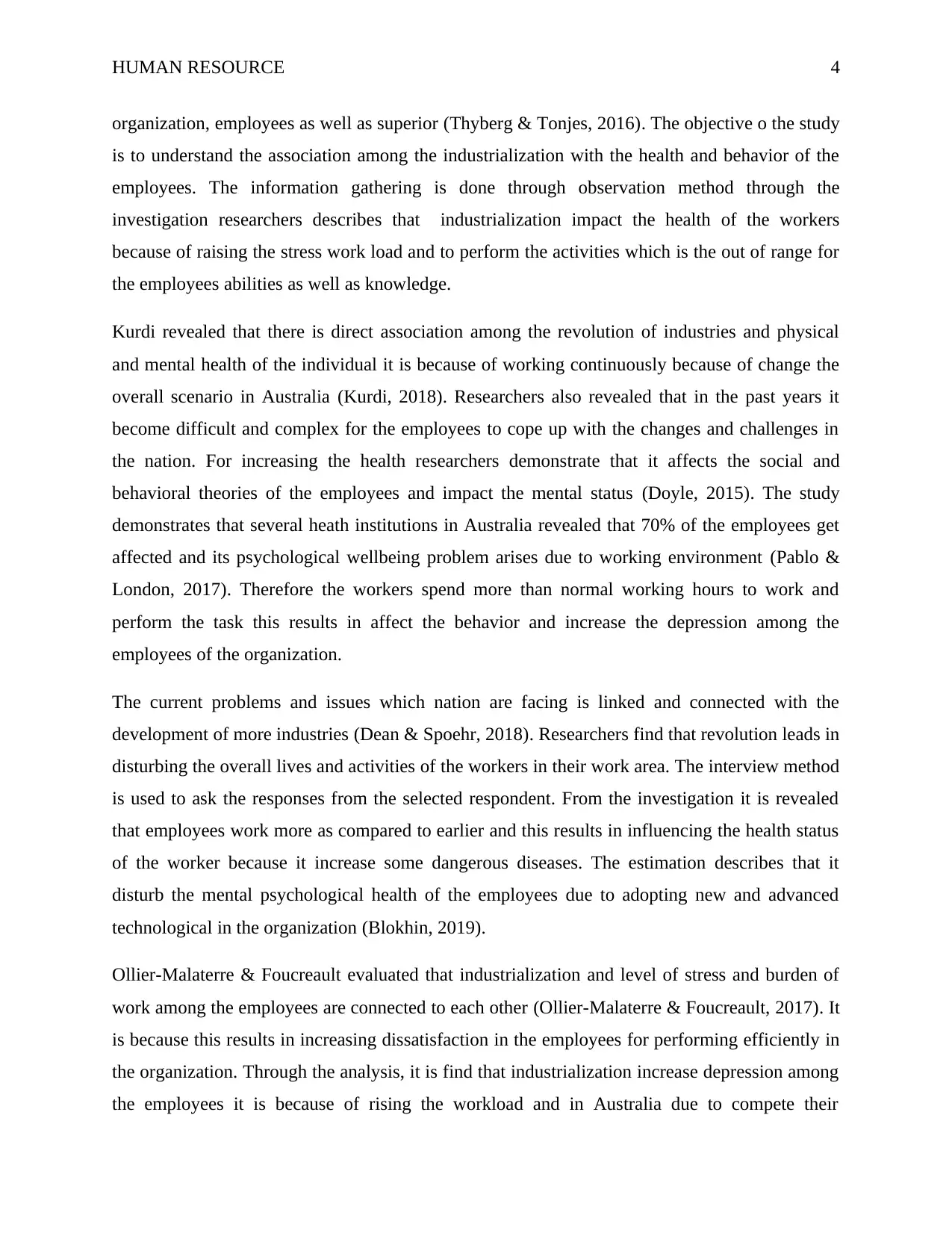
HUMAN RESOURCE 4
organization, employees as well as superior (Thyberg & Tonjes, 2016). The objective o the study
is to understand the association among the industrialization with the health and behavior of the
employees. The information gathering is done through observation method through the
investigation researchers describes that industrialization impact the health of the workers
because of raising the stress work load and to perform the activities which is the out of range for
the employees abilities as well as knowledge.
Kurdi revealed that there is direct association among the revolution of industries and physical
and mental health of the individual it is because of working continuously because of change the
overall scenario in Australia (Kurdi, 2018). Researchers also revealed that in the past years it
become difficult and complex for the employees to cope up with the changes and challenges in
the nation. For increasing the health researchers demonstrate that it affects the social and
behavioral theories of the employees and impact the mental status (Doyle, 2015). The study
demonstrates that several heath institutions in Australia revealed that 70% of the employees get
affected and its psychological wellbeing problem arises due to working environment (Pablo &
London, 2017). Therefore the workers spend more than normal working hours to work and
perform the task this results in affect the behavior and increase the depression among the
employees of the organization.
The current problems and issues which nation are facing is linked and connected with the
development of more industries (Dean & Spoehr, 2018). Researchers find that revolution leads in
disturbing the overall lives and activities of the workers in their work area. The interview method
is used to ask the responses from the selected respondent. From the investigation it is revealed
that employees work more as compared to earlier and this results in influencing the health status
of the worker because it increase some dangerous diseases. The estimation describes that it
disturb the mental psychological health of the employees due to adopting new and advanced
technological in the organization (Blokhin, 2019).
Ollier-Malaterre & Foucreault evaluated that industrialization and level of stress and burden of
work among the employees are connected to each other (Ollier-Malaterre & Foucreault, 2017). It
is because this results in increasing dissatisfaction in the employees for performing efficiently in
the organization. Through the analysis, it is find that industrialization increase depression among
the employees it is because of rising the workload and in Australia due to compete their
organization, employees as well as superior (Thyberg & Tonjes, 2016). The objective o the study
is to understand the association among the industrialization with the health and behavior of the
employees. The information gathering is done through observation method through the
investigation researchers describes that industrialization impact the health of the workers
because of raising the stress work load and to perform the activities which is the out of range for
the employees abilities as well as knowledge.
Kurdi revealed that there is direct association among the revolution of industries and physical
and mental health of the individual it is because of working continuously because of change the
overall scenario in Australia (Kurdi, 2018). Researchers also revealed that in the past years it
become difficult and complex for the employees to cope up with the changes and challenges in
the nation. For increasing the health researchers demonstrate that it affects the social and
behavioral theories of the employees and impact the mental status (Doyle, 2015). The study
demonstrates that several heath institutions in Australia revealed that 70% of the employees get
affected and its psychological wellbeing problem arises due to working environment (Pablo &
London, 2017). Therefore the workers spend more than normal working hours to work and
perform the task this results in affect the behavior and increase the depression among the
employees of the organization.
The current problems and issues which nation are facing is linked and connected with the
development of more industries (Dean & Spoehr, 2018). Researchers find that revolution leads in
disturbing the overall lives and activities of the workers in their work area. The interview method
is used to ask the responses from the selected respondent. From the investigation it is revealed
that employees work more as compared to earlier and this results in influencing the health status
of the worker because it increase some dangerous diseases. The estimation describes that it
disturb the mental psychological health of the employees due to adopting new and advanced
technological in the organization (Blokhin, 2019).
Ollier-Malaterre & Foucreault evaluated that industrialization and level of stress and burden of
work among the employees are connected to each other (Ollier-Malaterre & Foucreault, 2017). It
is because this results in increasing dissatisfaction in the employees for performing efficiently in
the organization. Through the analysis, it is find that industrialization increase depression among
the employees it is because of rising the workload and in Australia due to compete their
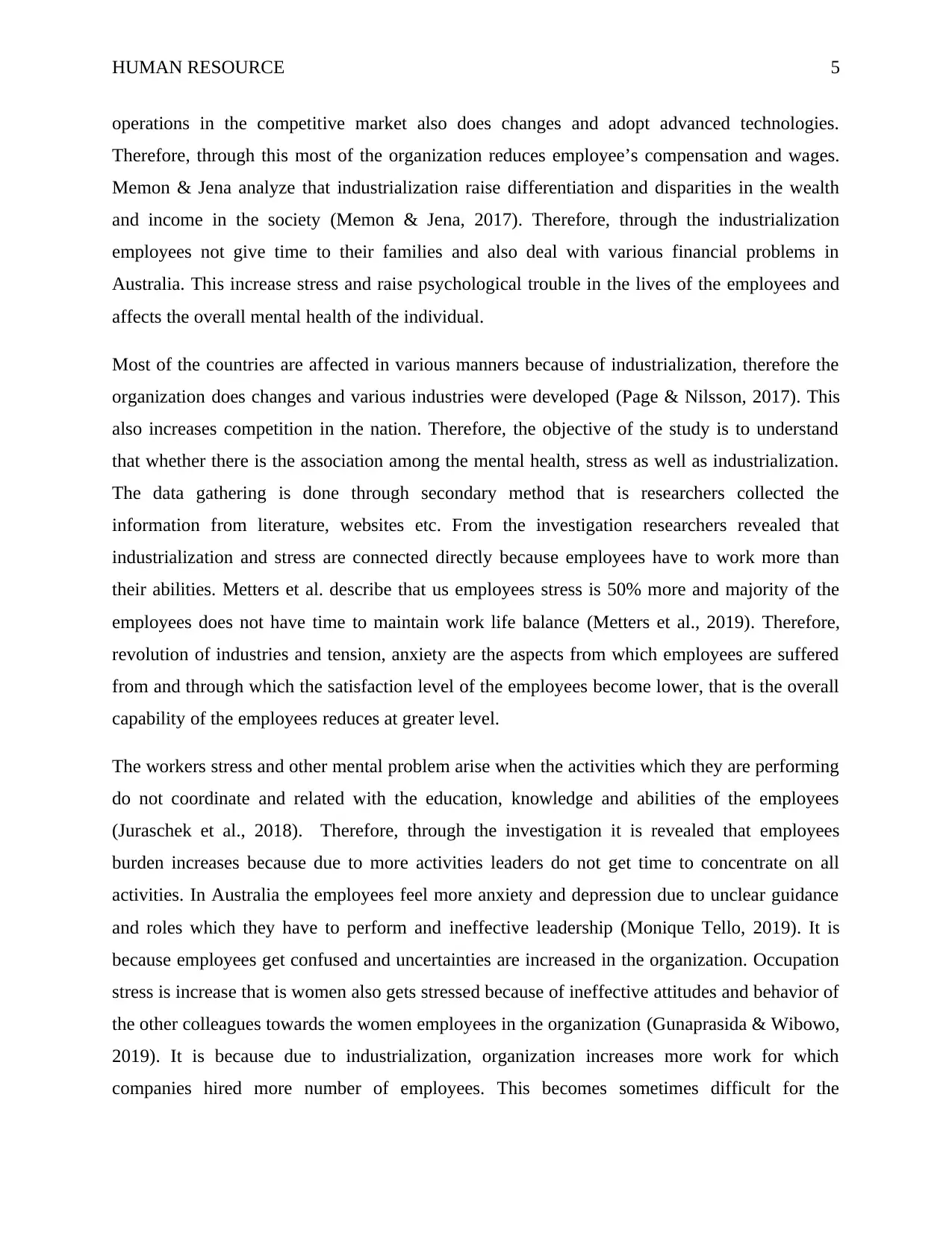
HUMAN RESOURCE 5
operations in the competitive market also does changes and adopt advanced technologies.
Therefore, through this most of the organization reduces employee’s compensation and wages.
Memon & Jena analyze that industrialization raise differentiation and disparities in the wealth
and income in the society (Memon & Jena, 2017). Therefore, through the industrialization
employees not give time to their families and also deal with various financial problems in
Australia. This increase stress and raise psychological trouble in the lives of the employees and
affects the overall mental health of the individual.
Most of the countries are affected in various manners because of industrialization, therefore the
organization does changes and various industries were developed (Page & Nilsson, 2017). This
also increases competition in the nation. Therefore, the objective of the study is to understand
that whether there is the association among the mental health, stress as well as industrialization.
The data gathering is done through secondary method that is researchers collected the
information from literature, websites etc. From the investigation researchers revealed that
industrialization and stress are connected directly because employees have to work more than
their abilities. Metters et al. describe that us employees stress is 50% more and majority of the
employees does not have time to maintain work life balance (Metters et al., 2019). Therefore,
revolution of industries and tension, anxiety are the aspects from which employees are suffered
from and through which the satisfaction level of the employees become lower, that is the overall
capability of the employees reduces at greater level.
The workers stress and other mental problem arise when the activities which they are performing
do not coordinate and related with the education, knowledge and abilities of the employees
(Juraschek et al., 2018). Therefore, through the investigation it is revealed that employees
burden increases because due to more activities leaders do not get time to concentrate on all
activities. In Australia the employees feel more anxiety and depression due to unclear guidance
and roles which they have to perform and ineffective leadership (Monique Tello, 2019). It is
because employees get confused and uncertainties are increased in the organization. Occupation
stress is increase that is women also gets stressed because of ineffective attitudes and behavior of
the other colleagues towards the women employees in the organization (Gunaprasida & Wibowo,
2019). It is because due to industrialization, organization increases more work for which
companies hired more number of employees. This becomes sometimes difficult for the
operations in the competitive market also does changes and adopt advanced technologies.
Therefore, through this most of the organization reduces employee’s compensation and wages.
Memon & Jena analyze that industrialization raise differentiation and disparities in the wealth
and income in the society (Memon & Jena, 2017). Therefore, through the industrialization
employees not give time to their families and also deal with various financial problems in
Australia. This increase stress and raise psychological trouble in the lives of the employees and
affects the overall mental health of the individual.
Most of the countries are affected in various manners because of industrialization, therefore the
organization does changes and various industries were developed (Page & Nilsson, 2017). This
also increases competition in the nation. Therefore, the objective of the study is to understand
that whether there is the association among the mental health, stress as well as industrialization.
The data gathering is done through secondary method that is researchers collected the
information from literature, websites etc. From the investigation researchers revealed that
industrialization and stress are connected directly because employees have to work more than
their abilities. Metters et al. describe that us employees stress is 50% more and majority of the
employees does not have time to maintain work life balance (Metters et al., 2019). Therefore,
revolution of industries and tension, anxiety are the aspects from which employees are suffered
from and through which the satisfaction level of the employees become lower, that is the overall
capability of the employees reduces at greater level.
The workers stress and other mental problem arise when the activities which they are performing
do not coordinate and related with the education, knowledge and abilities of the employees
(Juraschek et al., 2018). Therefore, through the investigation it is revealed that employees
burden increases because due to more activities leaders do not get time to concentrate on all
activities. In Australia the employees feel more anxiety and depression due to unclear guidance
and roles which they have to perform and ineffective leadership (Monique Tello, 2019). It is
because employees get confused and uncertainties are increased in the organization. Occupation
stress is increase that is women also gets stressed because of ineffective attitudes and behavior of
the other colleagues towards the women employees in the organization (Gunaprasida & Wibowo,
2019). It is because due to industrialization, organization increases more work for which
companies hired more number of employees. This becomes sometimes difficult for the
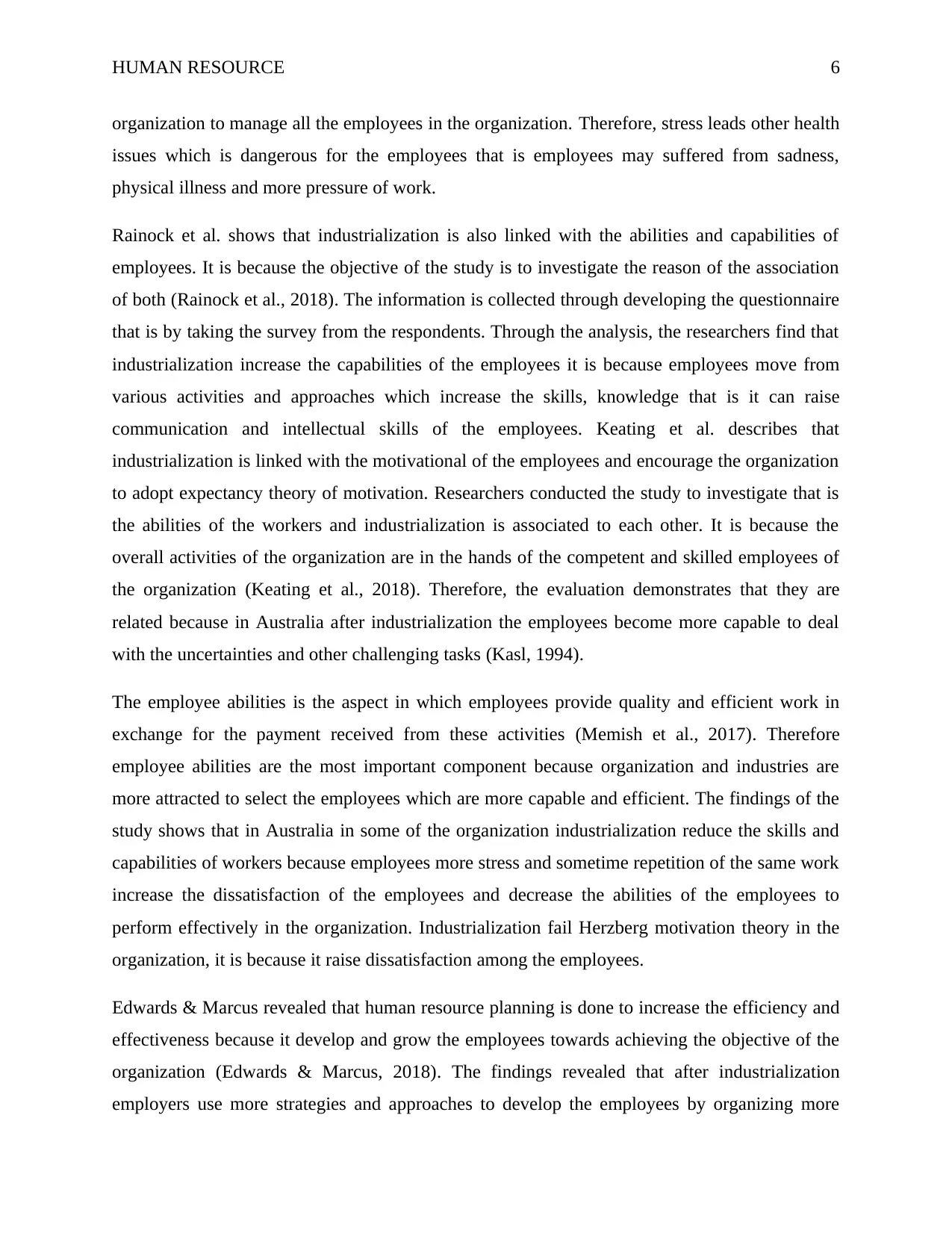
HUMAN RESOURCE 6
organization to manage all the employees in the organization. Therefore, stress leads other health
issues which is dangerous for the employees that is employees may suffered from sadness,
physical illness and more pressure of work.
Rainock et al. shows that industrialization is also linked with the abilities and capabilities of
employees. It is because the objective of the study is to investigate the reason of the association
of both (Rainock et al., 2018). The information is collected through developing the questionnaire
that is by taking the survey from the respondents. Through the analysis, the researchers find that
industrialization increase the capabilities of the employees it is because employees move from
various activities and approaches which increase the skills, knowledge that is it can raise
communication and intellectual skills of the employees. Keating et al. describes that
industrialization is linked with the motivational of the employees and encourage the organization
to adopt expectancy theory of motivation. Researchers conducted the study to investigate that is
the abilities of the workers and industrialization is associated to each other. It is because the
overall activities of the organization are in the hands of the competent and skilled employees of
the organization (Keating et al., 2018). Therefore, the evaluation demonstrates that they are
related because in Australia after industrialization the employees become more capable to deal
with the uncertainties and other challenging tasks (Kasl, 1994).
The employee abilities is the aspect in which employees provide quality and efficient work in
exchange for the payment received from these activities (Memish et al., 2017). Therefore
employee abilities are the most important component because organization and industries are
more attracted to select the employees which are more capable and efficient. The findings of the
study shows that in Australia in some of the organization industrialization reduce the skills and
capabilities of workers because employees more stress and sometime repetition of the same work
increase the dissatisfaction of the employees and decrease the abilities of the employees to
perform effectively in the organization. Industrialization fail Herzberg motivation theory in the
organization, it is because it raise dissatisfaction among the employees.
Edwards & Marcus revealed that human resource planning is done to increase the efficiency and
effectiveness because it develop and grow the employees towards achieving the objective of the
organization (Edwards & Marcus, 2018). The findings revealed that after industrialization
employers use more strategies and approaches to develop the employees by organizing more
organization to manage all the employees in the organization. Therefore, stress leads other health
issues which is dangerous for the employees that is employees may suffered from sadness,
physical illness and more pressure of work.
Rainock et al. shows that industrialization is also linked with the abilities and capabilities of
employees. It is because the objective of the study is to investigate the reason of the association
of both (Rainock et al., 2018). The information is collected through developing the questionnaire
that is by taking the survey from the respondents. Through the analysis, the researchers find that
industrialization increase the capabilities of the employees it is because employees move from
various activities and approaches which increase the skills, knowledge that is it can raise
communication and intellectual skills of the employees. Keating et al. describes that
industrialization is linked with the motivational of the employees and encourage the organization
to adopt expectancy theory of motivation. Researchers conducted the study to investigate that is
the abilities of the workers and industrialization is associated to each other. It is because the
overall activities of the organization are in the hands of the competent and skilled employees of
the organization (Keating et al., 2018). Therefore, the evaluation demonstrates that they are
related because in Australia after industrialization the employees become more capable to deal
with the uncertainties and other challenging tasks (Kasl, 1994).
The employee abilities is the aspect in which employees provide quality and efficient work in
exchange for the payment received from these activities (Memish et al., 2017). Therefore
employee abilities are the most important component because organization and industries are
more attracted to select the employees which are more capable and efficient. The findings of the
study shows that in Australia in some of the organization industrialization reduce the skills and
capabilities of workers because employees more stress and sometime repetition of the same work
increase the dissatisfaction of the employees and decrease the abilities of the employees to
perform effectively in the organization. Industrialization fail Herzberg motivation theory in the
organization, it is because it raise dissatisfaction among the employees.
Edwards & Marcus revealed that human resource planning is done to increase the efficiency and
effectiveness because it develop and grow the employees towards achieving the objective of the
organization (Edwards & Marcus, 2018). The findings revealed that after industrialization
employers use more strategies and approaches to develop the employees by organizing more
Paraphrase This Document
Need a fresh take? Get an instant paraphrase of this document with our AI Paraphraser
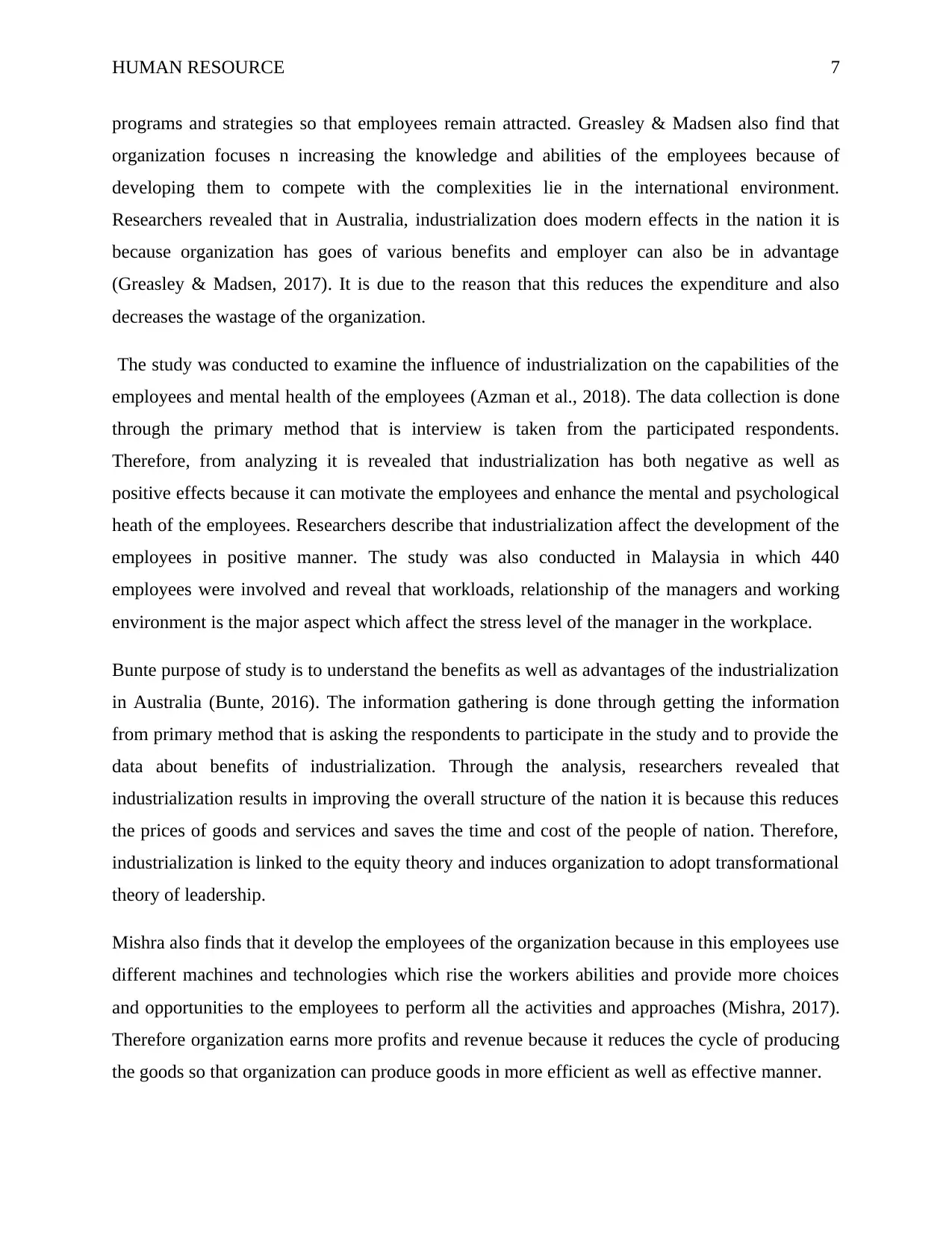
HUMAN RESOURCE 7
programs and strategies so that employees remain attracted. Greasley & Madsen also find that
organization focuses n increasing the knowledge and abilities of the employees because of
developing them to compete with the complexities lie in the international environment.
Researchers revealed that in Australia, industrialization does modern effects in the nation it is
because organization has goes of various benefits and employer can also be in advantage
(Greasley & Madsen, 2017). It is due to the reason that this reduces the expenditure and also
decreases the wastage of the organization.
The study was conducted to examine the influence of industrialization on the capabilities of the
employees and mental health of the employees (Azman et al., 2018). The data collection is done
through the primary method that is interview is taken from the participated respondents.
Therefore, from analyzing it is revealed that industrialization has both negative as well as
positive effects because it can motivate the employees and enhance the mental and psychological
heath of the employees. Researchers describe that industrialization affect the development of the
employees in positive manner. The study was also conducted in Malaysia in which 440
employees were involved and reveal that workloads, relationship of the managers and working
environment is the major aspect which affect the stress level of the manager in the workplace.
Bunte purpose of study is to understand the benefits as well as advantages of the industrialization
in Australia (Bunte, 2016). The information gathering is done through getting the information
from primary method that is asking the respondents to participate in the study and to provide the
data about benefits of industrialization. Through the analysis, researchers revealed that
industrialization results in improving the overall structure of the nation it is because this reduces
the prices of goods and services and saves the time and cost of the people of nation. Therefore,
industrialization is linked to the equity theory and induces organization to adopt transformational
theory of leadership.
Mishra also finds that it develop the employees of the organization because in this employees use
different machines and technologies which rise the workers abilities and provide more choices
and opportunities to the employees to perform all the activities and approaches (Mishra, 2017).
Therefore organization earns more profits and revenue because it reduces the cycle of producing
the goods so that organization can produce goods in more efficient as well as effective manner.
programs and strategies so that employees remain attracted. Greasley & Madsen also find that
organization focuses n increasing the knowledge and abilities of the employees because of
developing them to compete with the complexities lie in the international environment.
Researchers revealed that in Australia, industrialization does modern effects in the nation it is
because organization has goes of various benefits and employer can also be in advantage
(Greasley & Madsen, 2017). It is due to the reason that this reduces the expenditure and also
decreases the wastage of the organization.
The study was conducted to examine the influence of industrialization on the capabilities of the
employees and mental health of the employees (Azman et al., 2018). The data collection is done
through the primary method that is interview is taken from the participated respondents.
Therefore, from analyzing it is revealed that industrialization has both negative as well as
positive effects because it can motivate the employees and enhance the mental and psychological
heath of the employees. Researchers describe that industrialization affect the development of the
employees in positive manner. The study was also conducted in Malaysia in which 440
employees were involved and reveal that workloads, relationship of the managers and working
environment is the major aspect which affect the stress level of the manager in the workplace.
Bunte purpose of study is to understand the benefits as well as advantages of the industrialization
in Australia (Bunte, 2016). The information gathering is done through getting the information
from primary method that is asking the respondents to participate in the study and to provide the
data about benefits of industrialization. Through the analysis, researchers revealed that
industrialization results in improving the overall structure of the nation it is because this reduces
the prices of goods and services and saves the time and cost of the people of nation. Therefore,
industrialization is linked to the equity theory and induces organization to adopt transformational
theory of leadership.
Mishra also finds that it develop the employees of the organization because in this employees use
different machines and technologies which rise the workers abilities and provide more choices
and opportunities to the employees to perform all the activities and approaches (Mishra, 2017).
Therefore organization earns more profits and revenue because it reduces the cycle of producing
the goods so that organization can produce goods in more efficient as well as effective manner.
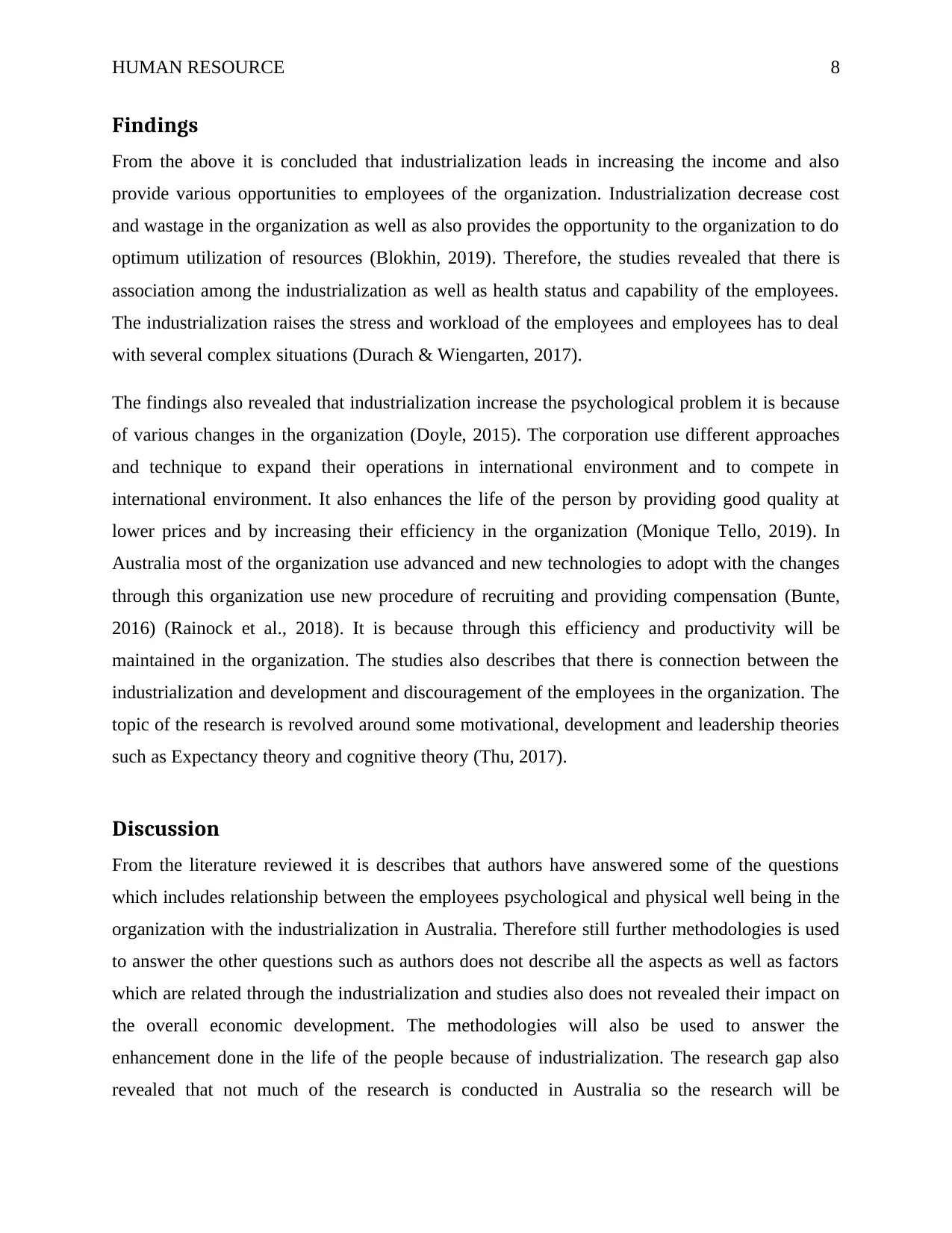
HUMAN RESOURCE 8
Findings
From the above it is concluded that industrialization leads in increasing the income and also
provide various opportunities to employees of the organization. Industrialization decrease cost
and wastage in the organization as well as also provides the opportunity to the organization to do
optimum utilization of resources (Blokhin, 2019). Therefore, the studies revealed that there is
association among the industrialization as well as health status and capability of the employees.
The industrialization raises the stress and workload of the employees and employees has to deal
with several complex situations (Durach & Wiengarten, 2017).
The findings also revealed that industrialization increase the psychological problem it is because
of various changes in the organization (Doyle, 2015). The corporation use different approaches
and technique to expand their operations in international environment and to compete in
international environment. It also enhances the life of the person by providing good quality at
lower prices and by increasing their efficiency in the organization (Monique Tello, 2019). In
Australia most of the organization use advanced and new technologies to adopt with the changes
through this organization use new procedure of recruiting and providing compensation (Bunte,
2016) (Rainock et al., 2018). It is because through this efficiency and productivity will be
maintained in the organization. The studies also describes that there is connection between the
industrialization and development and discouragement of the employees in the organization. The
topic of the research is revolved around some motivational, development and leadership theories
such as Expectancy theory and cognitive theory (Thu, 2017).
Discussion
From the literature reviewed it is describes that authors have answered some of the questions
which includes relationship between the employees psychological and physical well being in the
organization with the industrialization in Australia. Therefore still further methodologies is used
to answer the other questions such as authors does not describe all the aspects as well as factors
which are related through the industrialization and studies also does not revealed their impact on
the overall economic development. The methodologies will also be used to answer the
enhancement done in the life of the people because of industrialization. The research gap also
revealed that not much of the research is conducted in Australia so the research will be
Findings
From the above it is concluded that industrialization leads in increasing the income and also
provide various opportunities to employees of the organization. Industrialization decrease cost
and wastage in the organization as well as also provides the opportunity to the organization to do
optimum utilization of resources (Blokhin, 2019). Therefore, the studies revealed that there is
association among the industrialization as well as health status and capability of the employees.
The industrialization raises the stress and workload of the employees and employees has to deal
with several complex situations (Durach & Wiengarten, 2017).
The findings also revealed that industrialization increase the psychological problem it is because
of various changes in the organization (Doyle, 2015). The corporation use different approaches
and technique to expand their operations in international environment and to compete in
international environment. It also enhances the life of the person by providing good quality at
lower prices and by increasing their efficiency in the organization (Monique Tello, 2019). In
Australia most of the organization use advanced and new technologies to adopt with the changes
through this organization use new procedure of recruiting and providing compensation (Bunte,
2016) (Rainock et al., 2018). It is because through this efficiency and productivity will be
maintained in the organization. The studies also describes that there is connection between the
industrialization and development and discouragement of the employees in the organization. The
topic of the research is revolved around some motivational, development and leadership theories
such as Expectancy theory and cognitive theory (Thu, 2017).
Discussion
From the literature reviewed it is describes that authors have answered some of the questions
which includes relationship between the employees psychological and physical well being in the
organization with the industrialization in Australia. Therefore still further methodologies is used
to answer the other questions such as authors does not describe all the aspects as well as factors
which are related through the industrialization and studies also does not revealed their impact on
the overall economic development. The methodologies will also be used to answer the
enhancement done in the life of the people because of industrialization. The research gap also
revealed that not much of the research is conducted in Australia so the research will be
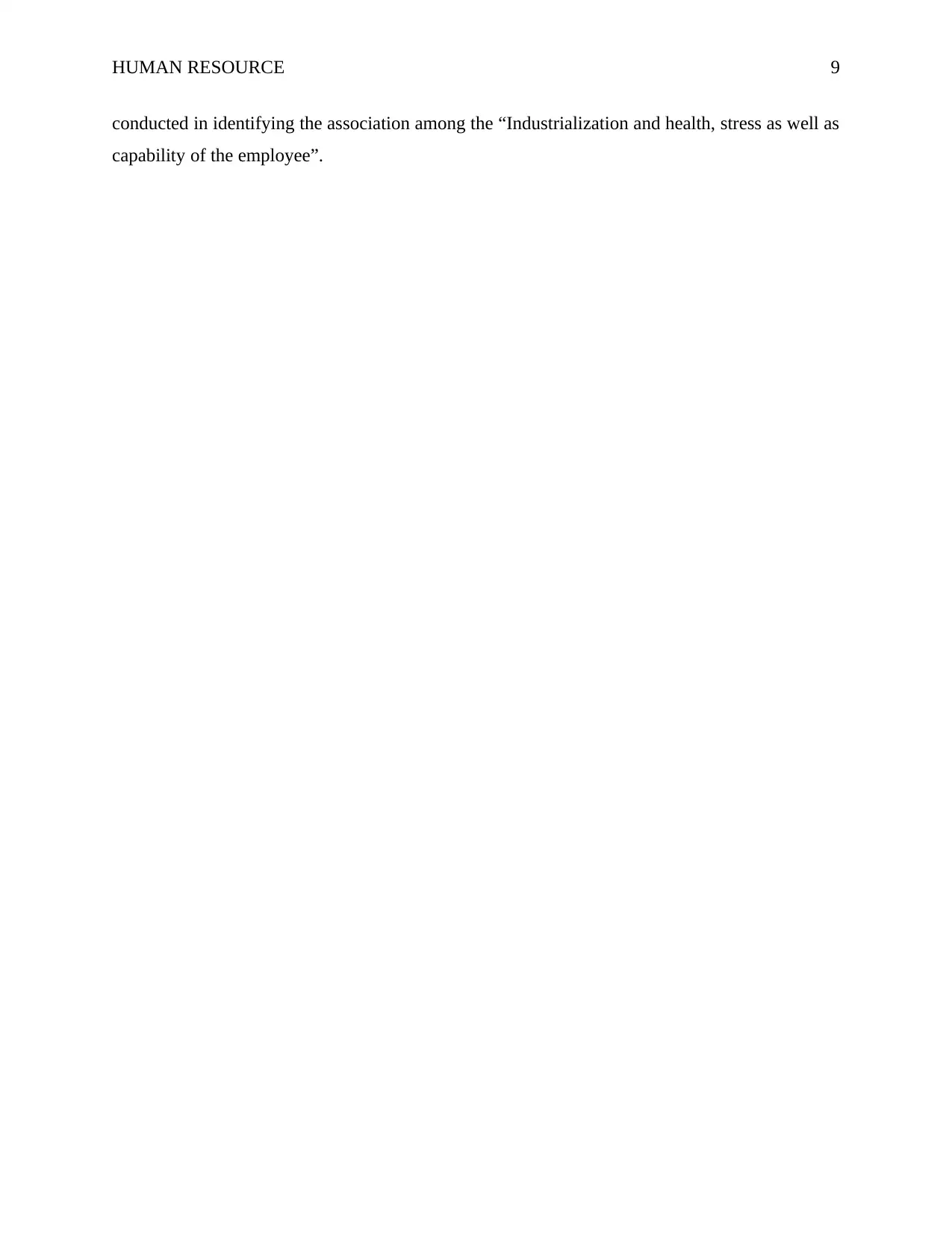
HUMAN RESOURCE 9
conducted in identifying the association among the “Industrialization and health, stress as well as
capability of the employee”.
conducted in identifying the association among the “Industrialization and health, stress as well as
capability of the employee”.
Secure Best Marks with AI Grader
Need help grading? Try our AI Grader for instant feedback on your assignments.
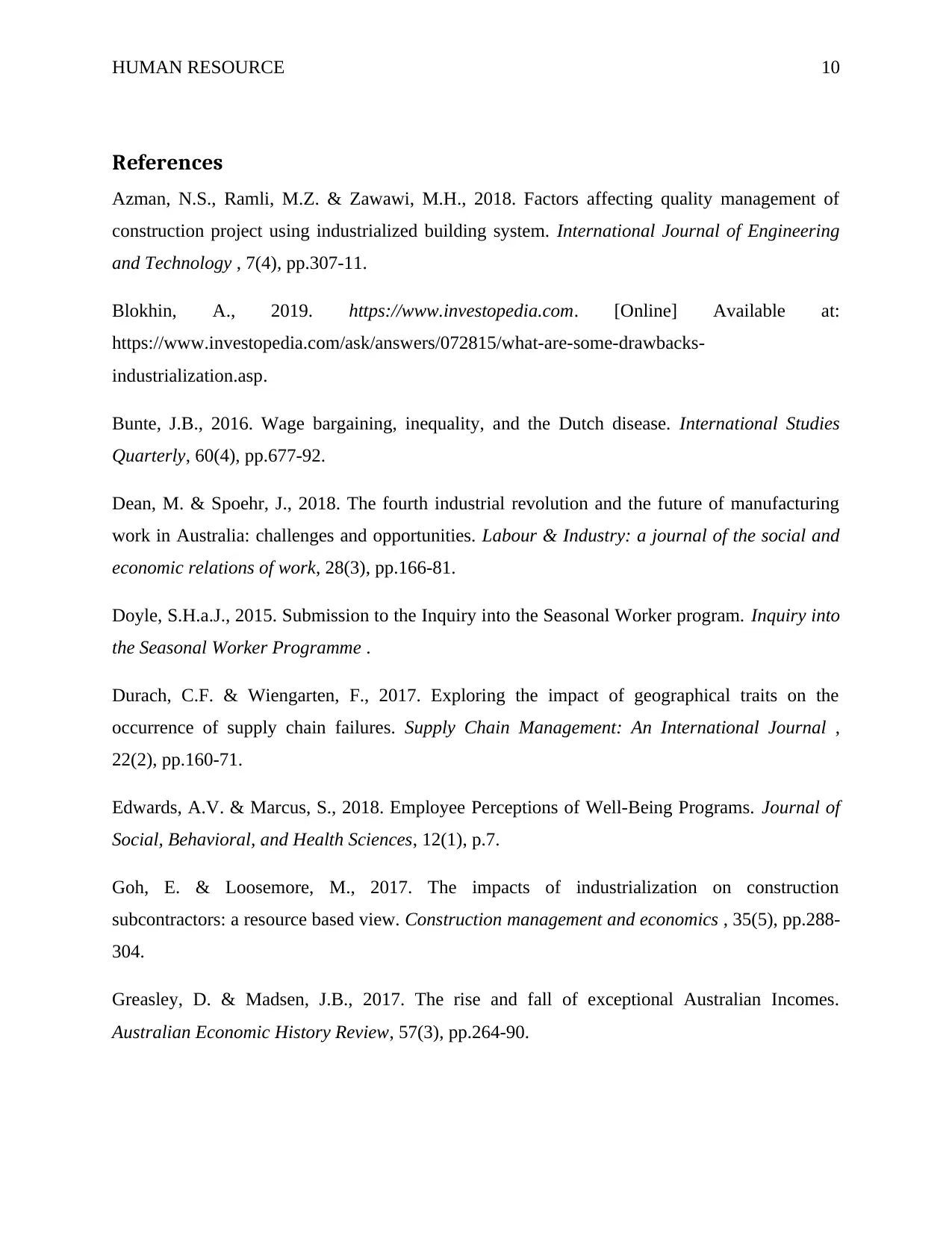
HUMAN RESOURCE 10
References
Azman, N.S., Ramli, M.Z. & Zawawi, M.H., 2018. Factors affecting quality management of
construction project using industrialized building system. International Journal of Engineering
and Technology , 7(4), pp.307-11.
Blokhin, A., 2019. https://www.investopedia.com. [Online] Available at:
https://www.investopedia.com/ask/answers/072815/what-are-some-drawbacks-
industrialization.asp.
Bunte, J.B., 2016. Wage bargaining, inequality, and the Dutch disease. International Studies
Quarterly, 60(4), pp.677-92.
Dean, M. & Spoehr, J., 2018. The fourth industrial revolution and the future of manufacturing
work in Australia: challenges and opportunities. Labour & Industry: a journal of the social and
economic relations of work, 28(3), pp.166-81.
Doyle, S.H.a.J., 2015. Submission to the Inquiry into the Seasonal Worker program. Inquiry into
the Seasonal Worker Programme .
Durach, C.F. & Wiengarten, F., 2017. Exploring the impact of geographical traits on the
occurrence of supply chain failures. Supply Chain Management: An International Journal ,
22(2), pp.160-71.
Edwards, A.V. & Marcus, S., 2018. Employee Perceptions of Well-Being Programs. Journal of
Social, Behavioral, and Health Sciences, 12(1), p.7.
Goh, E. & Loosemore, M., 2017. The impacts of industrialization on construction
subcontractors: a resource based view. Construction management and economics , 35(5), pp.288-
304.
Greasley, D. & Madsen, J.B., 2017. The rise and fall of exceptional Australian Incomes.
Australian Economic History Review, 57(3), pp.264-90.
References
Azman, N.S., Ramli, M.Z. & Zawawi, M.H., 2018. Factors affecting quality management of
construction project using industrialized building system. International Journal of Engineering
and Technology , 7(4), pp.307-11.
Blokhin, A., 2019. https://www.investopedia.com. [Online] Available at:
https://www.investopedia.com/ask/answers/072815/what-are-some-drawbacks-
industrialization.asp.
Bunte, J.B., 2016. Wage bargaining, inequality, and the Dutch disease. International Studies
Quarterly, 60(4), pp.677-92.
Dean, M. & Spoehr, J., 2018. The fourth industrial revolution and the future of manufacturing
work in Australia: challenges and opportunities. Labour & Industry: a journal of the social and
economic relations of work, 28(3), pp.166-81.
Doyle, S.H.a.J., 2015. Submission to the Inquiry into the Seasonal Worker program. Inquiry into
the Seasonal Worker Programme .
Durach, C.F. & Wiengarten, F., 2017. Exploring the impact of geographical traits on the
occurrence of supply chain failures. Supply Chain Management: An International Journal ,
22(2), pp.160-71.
Edwards, A.V. & Marcus, S., 2018. Employee Perceptions of Well-Being Programs. Journal of
Social, Behavioral, and Health Sciences, 12(1), p.7.
Goh, E. & Loosemore, M., 2017. The impacts of industrialization on construction
subcontractors: a resource based view. Construction management and economics , 35(5), pp.288-
304.
Greasley, D. & Madsen, J.B., 2017. The rise and fall of exceptional Australian Incomes.
Australian Economic History Review, 57(3), pp.264-90.
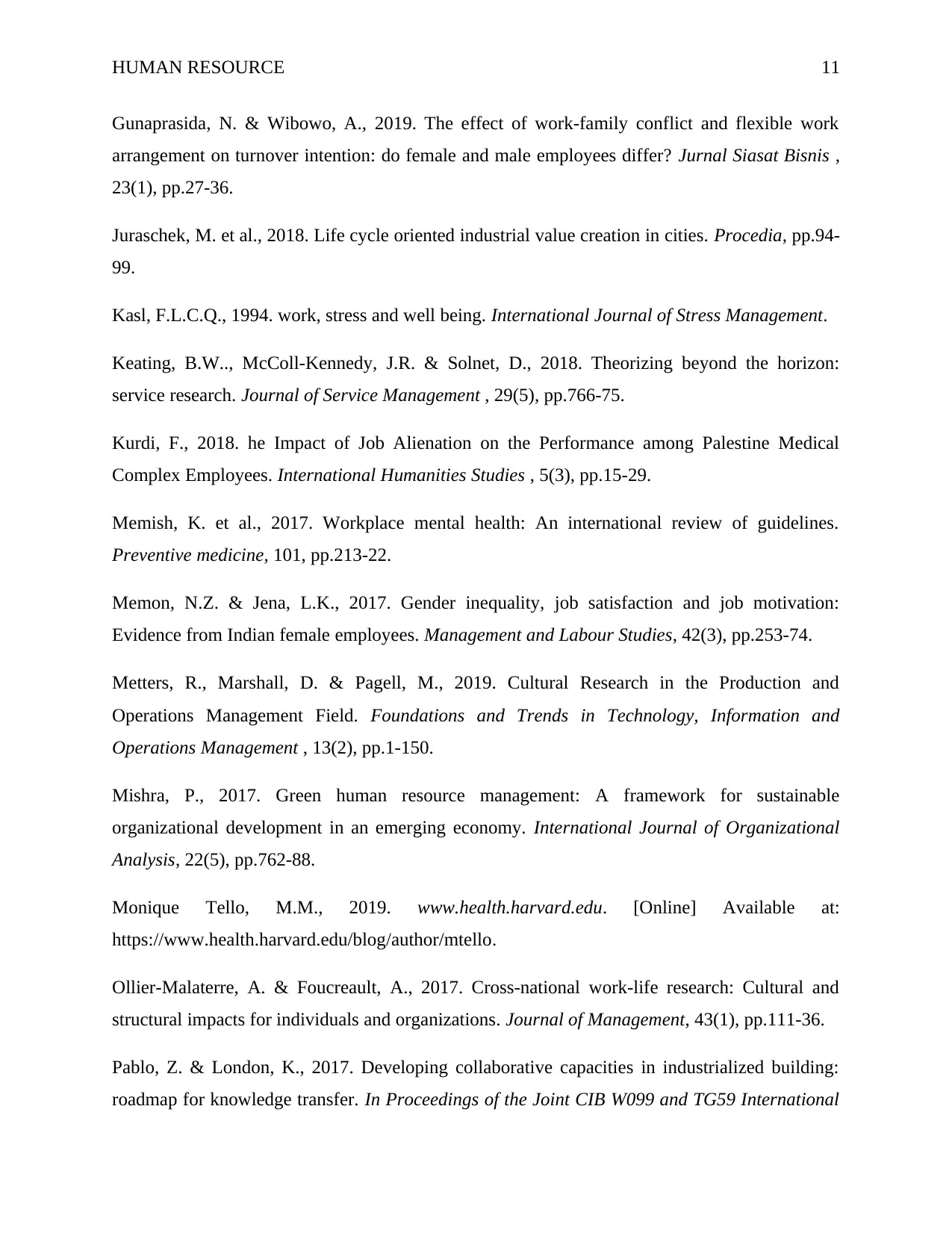
HUMAN RESOURCE 11
Gunaprasida, N. & Wibowo, A., 2019. The effect of work-family conflict and flexible work
arrangement on turnover intention: do female and male employees differ? Jurnal Siasat Bisnis ,
23(1), pp.27-36.
Juraschek, M. et al., 2018. Life cycle oriented industrial value creation in cities. Procedia, pp.94-
99.
Kasl, F.L.C.Q., 1994. work, stress and well being. International Journal of Stress Management.
Keating, B.W.., McColl-Kennedy, J.R. & Solnet, D., 2018. Theorizing beyond the horizon:
service research. Journal of Service Management , 29(5), pp.766-75.
Kurdi, F., 2018. he Impact of Job Alienation on the Performance among Palestine Medical
Complex Employees. International Humanities Studies , 5(3), pp.15-29.
Memish, K. et al., 2017. Workplace mental health: An international review of guidelines.
Preventive medicine, 101, pp.213-22.
Memon, N.Z. & Jena, L.K., 2017. Gender inequality, job satisfaction and job motivation:
Evidence from Indian female employees. Management and Labour Studies, 42(3), pp.253-74.
Metters, R., Marshall, D. & Pagell, M., 2019. Cultural Research in the Production and
Operations Management Field. Foundations and Trends in Technology, Information and
Operations Management , 13(2), pp.1-150.
Mishra, P., 2017. Green human resource management: A framework for sustainable
organizational development in an emerging economy. International Journal of Organizational
Analysis, 22(5), pp.762-88.
Monique Tello, M.M., 2019. www.health.harvard.edu. [Online] Available at:
https://www.health.harvard.edu/blog/author/mtello.
Ollier-Malaterre, A. & Foucreault, A., 2017. Cross-national work-life research: Cultural and
structural impacts for individuals and organizations. Journal of Management, 43(1), pp.111-36.
Pablo, Z. & London, K., 2017. Developing collaborative capacities in industrialized building:
roadmap for knowledge transfer. In Proceedings of the Joint CIB W099 and TG59 International
Gunaprasida, N. & Wibowo, A., 2019. The effect of work-family conflict and flexible work
arrangement on turnover intention: do female and male employees differ? Jurnal Siasat Bisnis ,
23(1), pp.27-36.
Juraschek, M. et al., 2018. Life cycle oriented industrial value creation in cities. Procedia, pp.94-
99.
Kasl, F.L.C.Q., 1994. work, stress and well being. International Journal of Stress Management.
Keating, B.W.., McColl-Kennedy, J.R. & Solnet, D., 2018. Theorizing beyond the horizon:
service research. Journal of Service Management , 29(5), pp.766-75.
Kurdi, F., 2018. he Impact of Job Alienation on the Performance among Palestine Medical
Complex Employees. International Humanities Studies , 5(3), pp.15-29.
Memish, K. et al., 2017. Workplace mental health: An international review of guidelines.
Preventive medicine, 101, pp.213-22.
Memon, N.Z. & Jena, L.K., 2017. Gender inequality, job satisfaction and job motivation:
Evidence from Indian female employees. Management and Labour Studies, 42(3), pp.253-74.
Metters, R., Marshall, D. & Pagell, M., 2019. Cultural Research in the Production and
Operations Management Field. Foundations and Trends in Technology, Information and
Operations Management , 13(2), pp.1-150.
Mishra, P., 2017. Green human resource management: A framework for sustainable
organizational development in an emerging economy. International Journal of Organizational
Analysis, 22(5), pp.762-88.
Monique Tello, M.M., 2019. www.health.harvard.edu. [Online] Available at:
https://www.health.harvard.edu/blog/author/mtello.
Ollier-Malaterre, A. & Foucreault, A., 2017. Cross-national work-life research: Cultural and
structural impacts for individuals and organizations. Journal of Management, 43(1), pp.111-36.
Pablo, Z. & London, K., 2017. Developing collaborative capacities in industrialized building:
roadmap for knowledge transfer. In Proceedings of the Joint CIB W099 and TG59 International
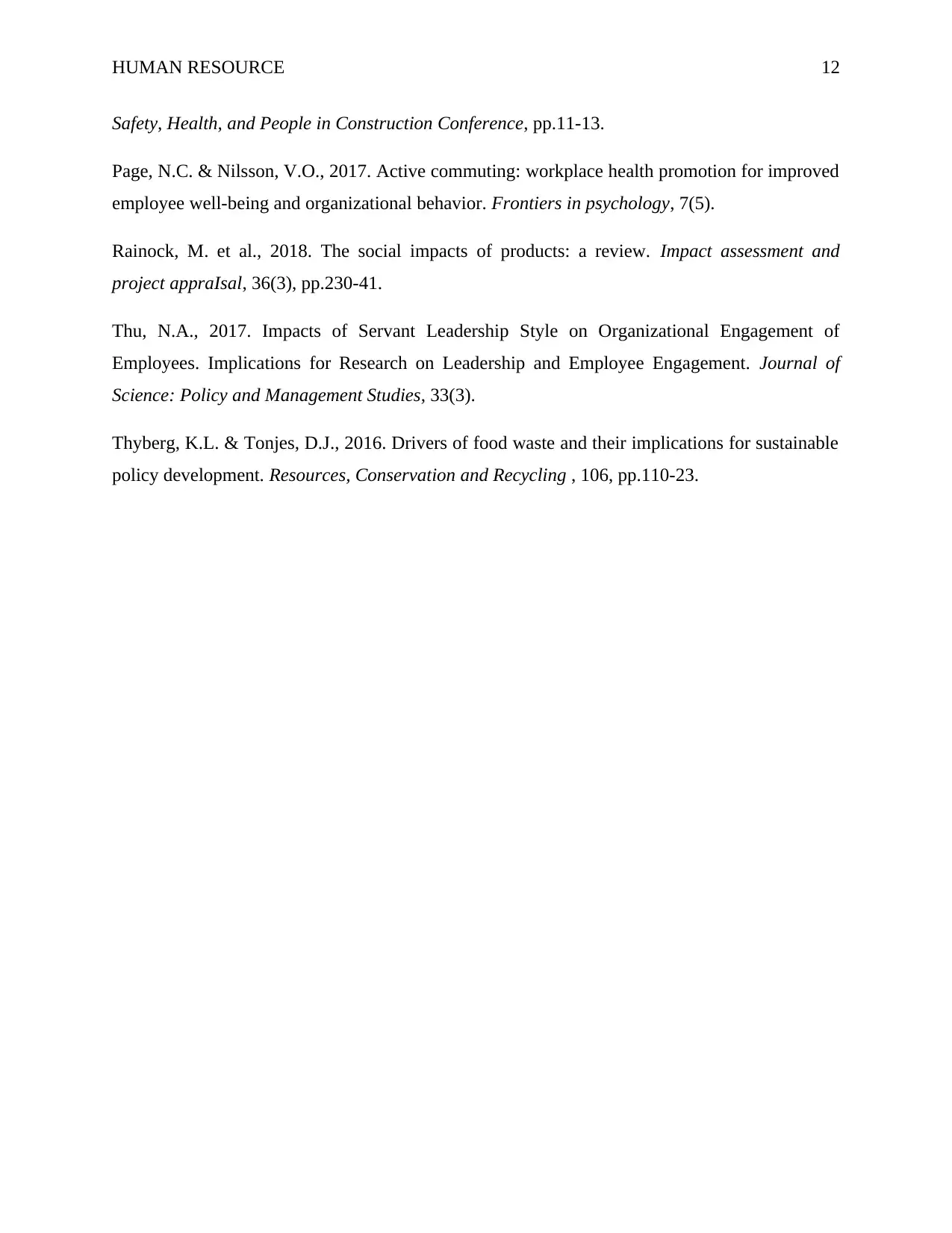
HUMAN RESOURCE 12
Safety, Health, and People in Construction Conference, pp.11-13.
Page, N.C. & Nilsson, V.O., 2017. Active commuting: workplace health promotion for improved
employee well-being and organizational behavior. Frontiers in psychology, 7(5).
Rainock, M. et al., 2018. The social impacts of products: a review. Impact assessment and
project appraIsal, 36(3), pp.230-41.
Thu, N.A., 2017. Impacts of Servant Leadership Style on Organizational Engagement of
Employees. Implications for Research on Leadership and Employee Engagement. Journal of
Science: Policy and Management Studies, 33(3).
Thyberg, K.L. & Tonjes, D.J., 2016. Drivers of food waste and their implications for sustainable
policy development. Resources, Conservation and Recycling , 106, pp.110-23.
Safety, Health, and People in Construction Conference, pp.11-13.
Page, N.C. & Nilsson, V.O., 2017. Active commuting: workplace health promotion for improved
employee well-being and organizational behavior. Frontiers in psychology, 7(5).
Rainock, M. et al., 2018. The social impacts of products: a review. Impact assessment and
project appraIsal, 36(3), pp.230-41.
Thu, N.A., 2017. Impacts of Servant Leadership Style on Organizational Engagement of
Employees. Implications for Research on Leadership and Employee Engagement. Journal of
Science: Policy and Management Studies, 33(3).
Thyberg, K.L. & Tonjes, D.J., 2016. Drivers of food waste and their implications for sustainable
policy development. Resources, Conservation and Recycling , 106, pp.110-23.
1 out of 13
Related Documents
Your All-in-One AI-Powered Toolkit for Academic Success.
+13062052269
info@desklib.com
Available 24*7 on WhatsApp / Email
![[object Object]](/_next/static/media/star-bottom.7253800d.svg)
Unlock your academic potential
© 2024 | Zucol Services PVT LTD | All rights reserved.





